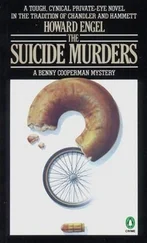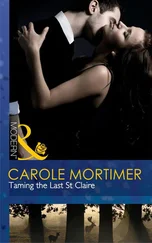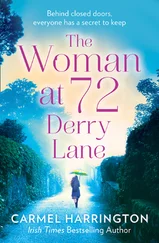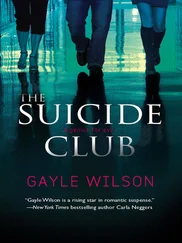When Claire had to give up her job, she thought of taking work elsewhere. But Freddie held her close and said she’d only been playing a role while he was away and now he wanted her home where he could find her. “Working seems unnatural, don’t you think?”
Through the war, Claire had lied to Freddie that she could not bear children, that she’d been warned it would pose terrible health risks and might even kill her. She did not tell him her real fear, that she would pass on a monstrous gene, and worse, not be around for her children, the way her own mother had been alone.
But Freddie was determined they visit the best doctors to see what could be done. Claire obliged, and in the course of discovering that she was perfectly healthy, it became apparent that Freddie was not. Trauma he’d suffered during the war — in fact, a wrestling match with one of his Army buddies — had caused groin damage far worse than he’d previously thought. All of this, of course, came as a relief to Claire.
The closer Claire came to the dreaded age, the closer she grew to Freddie. She’d never felt so powerful as she did in bed with him. She moved as if she owned both their bodies. She loved sitting beside him in the cinema, the smell of his collar, how rare he liked his steak. But mostly, she loved doing nothing more than lying in bed with him and wasting the day away unclothed. She ignored the thoughtlessness of his late-night work meetings, how cold he could be, how forgetful of the parties she planned. How was he to know that her time was running out?
Every day after her twenty-fourth birthday, Claire performed a mental tally of her faculties. Everything was in working order. In fact, she was much quicker than Freddie at learning Spanish for a business trip to Cuba she didn’t have the heart to tell him they’d never take. But no initial signs presented themselves.
Though Claire assumed that the symptoms would appear soon enough, she thought it prudent to ask her mother, as nonchalantly as possible, to repeat the details of her grandmother’s health. The trip home would also be a chance to say goodbye. While Freddie was staying in the city on business, Claire returned to Ovid for the first time in many months.
Her father had never completely forgiven her for leaving against his wishes. Since the war, he’d managed to open his own woodworking and restoration shop, and when Claire returned, he spent most of his time there, away from home. Still, she visited him, and made a game of heckling the one old Irishman who still protested outside the shop. Ernest’s only response to him was to hang a sign in the window that read, “I’m an American-German so I know my wood,” even though Germans weren’t particularly known for woodworking.
When Claire asked Elsa how her grandmother was fairing, Elsa said, “She died. While you were busy.”
Why hadn’t her mother told her? Instead, she asked, “Was it her Huntington’s Disease or something else?”
Her mother gave a strange laugh. And then she said, “She never had Huntington’s.”
Apparently, they’d lied to the authorities so her grandmother would be allowed to remain in the hospital, a loophole for hereditary diseases. In fact, her condition was the result of a head injury she’d suffered on the ship that brought her to America. She died of pneumonia in the end.
Claire didn’t say a word. She walked over to Elsa. And she slapped her.
How quickly it all changed. Now she was frozen in Freddie’s arms. What was supposed to have been a fleeting handful of years was now a life.
Here was the man who didn’t move her. The transformation was like a loss of consciousness, but Freddie didn’t notice. She hated the smell of sweat under his collar, the way he sniffed his food before he ate it. She hated the way he moved against her, clammy and rough. His attraction to Claire petered off as well, connected as it was to hers. Now she turned a blind eye at how often he missed the last train north, stayed late at the office, slept weekly in the city.
Twice, Claire was caught shoplifting from the grocery store in Croton — potato chips, a magazine, peppermint-flavored chewing tobacco. Once, Freddie caught her skinny-dipping in a creek by their house. Claire splashed him as he stood on the bank in his suit.
“Why don’t you come in with me? Or are you scared?”
“Get out of there, Claire. You look mad. You’ll catch your death.”
“You’ll catch yours first,” Claire said. He turned to go. “Why are you dressed like that?”
“I’m going into work.”
“It’s Sunday.” Claire climbed out of the water. She was shivering. Freddie took off his jacket and draped it around her.
“I think we should move,” Freddie said.
Claire dropped his jacket to the dirt. “Because I’ve embarrassed you?”
Freddie sighed. “Where, tell me, will you stop acting like a child?”
To her parents, the city might as well have been another country. She spoke to Elsa and Ernest less and less, and only about the weather or Ernest’s health, resigned in the knowledge that her parents and Freddie would never know why she was the way she was.
But Nicolette knew. Humming over the portrait, the artist had said, as if diagnosing Claire, “You lived your life afraid you’d go mad.” She leaned in close to the painting. “And now you’re disappointed.”
The sound of coming home and shutting doors. Freddie taking off his coat. Freddie standing mockingly in the kitchen doorway. She mixed herself a drink like she was mixing herself.
“Is that for me?” he said, eyeing the drink in her hand.
She took a sip. Of all the nights for him to return at a reasonable hour.
He started toward the den. Claire tripped after him into the hall, splashing gin on his suit.
“What in the devil, Claire?”
“You can’t look at it,” she said. Another sip.
“Look at it?”
“The painting. We’re not allowed until it’s done.”
“I was heading to the shower. What’s gotten into you?”
Claire lifted her glass to her lips in answer. The handsome, stupid man. Eyes like steel ball bearings.
Freddie grinned. “You’ve seen it, haven’t you? You little cheater,” he said, so pleased with himself to have figured her out. “If you can look, I sure as hell can. I’m the one paying.”
“We’re not allowed,” she said again, lifting her hand as he brushed passed her to the den.
“Oh that’s garbage, not allowed. It’s our painting. Yours. We can do what we like.”
She followed Freddie to the corner near the canvas. Claire faced the back of the easel. He lifted the drape by a gold tassel.
“What’s this?” he said.
“That’s it.”
“That’s it. This is not it. What is this? A prank? Did she say anything?”
“Say anything?”
“To explain it.”
“No, I don’t think so.”
“You don’t think so.”
“I don’t think so.”
They stood facing one another, the painting between them. She set her empty glass on the coffee table and straightened her back.
“I think you should apologize to me,” Claire said, surprised as Freddie by the words.
“Apologize.” Freddie grinned again. “Apologize for what?”
Claire didn’t know. Her own head was stamping down her neck. She straightened her spine again. “Were you sleeping with her?”
Freddie stopped grinning. “Don’t be stupid.” Nearly a whisper.
Claire’s eyes started to prickle. She would not cry. “What does she mean by it?”
“Don’t ask me. How should I know?” He looked at her shoulder instead of her face.
“Fine. I’ll ask her. She’s coming back tomorrow.”
“The hell she is.”
Читать дальше












